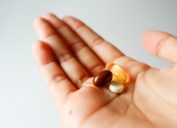2 Supplements Can Boost Your Brain Function in Just 12 Weeks, New Study Finds
Researchers say these plant fibers are effective and affordable.

Brain health should be front of mind at every age, but it becomes that much more of a concern as we get older and the risk of developing dementia gets higher. Research has shown that a number of strategies can keep the brain young, but if you're only doing crossword puzzles or getting your daily walk in, you might want to consider adding a supplement as well. A new study found that two prebiotics can help to improve your brain function in just 12 weeks.
RELATED: 8 Best Supplements for Brain Health, New Research Shows.
The study was performed by researchers at the School of Life Course & Population Sciences at King's College London, with results published in Nature Communications on Feb. 29. Researchers focused on two prebiotic plant fiber supplements, fructooligosaccharide (FOS) and inulin, assessing their effects on cognition and muscle strength in adults over 60, according to a press release outlining study findings.
Per the Mayo Clinic, prebiotics are foods that help improve the good bacteria in your gut, meaning they're different from probiotics. Inulin is a dietary fiber naturally found in plants, according to Medical News Today, while FOS is a type of carbohydrate found in many different plants, such as onions, garlic, artichokes, bananas, and asparagus, among others. FOS is also commonly used as an alternative sweetener.
For this study, researchers were assessing the effect of these two prebiotic supplements on the gut microbiome, which studies have suggested plays a role in muscle physiology and cognition as we age. To understand this relationship, a total of 36 pairs of twins received either a placebo or a supplement every day for 12 weeks.
At the end of the study period, the group that received the fiber supplement performed better in tests that assessed brain function, including one that is an early marker for Alzheimer's disease (the Paired Associates Learning test) when compared with those who received a placebo. Participants taking the supplements also had fewer errors when taking a memory test.
RELATED: 6 Foods That Can Lower Your Dementia Risk, Science Says.
The study provided additional evidence to support the connection between the brain and the gut (the gut-brain axis). After 12 weeks, researchers concluded that fiber supplements "led to significant changes in participants' gut microbiome composition, particularly an increase in the numbers of beneficial bacteria such as Bifidobacterium."
"We are excited to see these changes in just 12 weeks," Mary Ní Lochlainn, post-doctoral National Institute for Health and Care Research Fellow from the Department of Twin Research at King's College London, said in the press release. "This holds huge promise for enhancing brain health and memory in our ageing population. Unlocking the secrets of the gut-brain axis could offer new approaches for living more healthily for longer."
As a bonus, senior study author Claire Steves, professor of aging and health, and clinical director of TwinsUK at King's College London, noted that the supplements are accessible and affordable.
"These plant fibres, which are cheap and available over-the counter, could benefit a wide group of people in these cash-strapped times. They are safe and acceptable too," Steves said in the press release.
RELATED: "Exciting" New Study Finds Daily Multivitamin Can Keep Your Brain Young.
However, although there were positive effects on cognition, researchers didn't find that the supplements had any effect on muscle strength during the 12-week period. Throughout the study, participants did resistance exercises and took a separate protein supplement "aimed at improving muscle function," the press release states.
The study was conducted remotely, with patients monitored via video, and taking questionnaires and cognitive tests online. Study authors highlighted this as a potential benefit for future research, as it doesn't require older adults to travel or get to a hospital.
There were also a few limitations, including a pool of mostly female participants and researchers' inability to assess muscle mass due to the remote setting. Study authors also conceded that larger research projects need to address digital literacy and access to technology.
Moving forward, Steves says that researchers will also investigate "whether these effects are sustained over longer periods and in larger groups of people."
Best Life offers the most up-to-date information from top experts, new research, and health agencies, but our content is not meant to be a substitute for professional guidance. When it comes to the medication you're taking or any other health questions you have, always consult your healthcare provider directly.





















